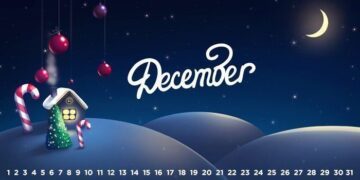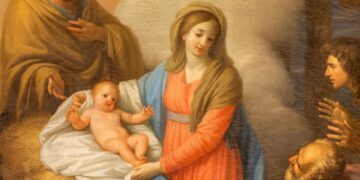Sitting between November and January, December is the twelfth and final month of the Gregorian calendar.
December, on the whole, is almost completely overwhelmed by different holiday customs and traditions, with little else being focused on during this period.
What little energy we have left to focus on anything else tends to be used up by complaining about the weather.
For those in the northern hemisphere, winter has finally arrived, so prepare yourself for gloomy days spent inside, huddled by the heater.
It’s not all bad, though; it’s a fantastic time to catch up on all those books you’ve been planning to read!
December is unsurprisingly quite different for those who live in the southern hemisphere.
Summer has well and truly begun by this point, and it’s just going to get hotter and hotter!
December in the southern hemisphere can be scorchingly hot, so it’s always a good idea to stay hydrated and enjoy the cool of the evening rather than venturing out during the day.
There are positives, too, of course; it’s also a time for pool parties and endless barbecues!
Like every other month of the year, December has plenty to show for itself.
Let’s take a look at the origins of December, the traditions we celebrate during it, as well as some interesting little facts to bring it all together!
December was one of the original months in the ancient Roman calendar, which was in use from around 750 BC until 45 BC. In this original Roman calendar, December was actually the tenth month. This placement actually makes a lot more sense for December, as this month’s name translates into “tenth month.” When Julius Caesar changed the calendar in 45 BC to the Julian calendar, he added two months, January and February, which were inserted at the beginning of the calendar year. These changes have forever cursed December to be a month with the wrong name.
On December 5, 1901, a little magic came into the world along with the birth of Walt Disney. Disney released his first cartoon, featuring Mickey Mouse, called Steamboat Willie at the age of 27. By the time he was 54, the Disney empire grew in size with the construction of Disneyland in Anaheim, California. Today Disney is a common word in households around the world thanks to the endless number of books, cartoons, films, and other forms of entertainment created by the Walt Disney Company.
December originally had just 30 days, according to the ancient Roman calendar. When the calendar was changed for the Julian calendar, December gained a day, making it the seventh and last month in the year with 31 days.
On December 8, 1991, the wheels and cogs of the USSR (Union of Soviet Socialist Republics, commonly known as the Soviet Union) came to a screeching halt as the USSR was dissolved.
The Anglo-Saxons originally had their own names for the month of December. One of these names was “Winter Monath,” which quite obviously translates into “Winter Month” and requires no real explanation.
December 10, 1896, saw the death of the Nobel Prize’s namesake, Alfred Nobel. In Nobel’s will, he declared that his accumulated wealth be used to give awards to members of society who show great achievement in the advancement of humanity. Some of the most famous Nobel prize recipients include Albert Einstein, Marie Curie, and Martin Luther King Jr..
A second name that the Anglo-Saxons had for December was “Yule Monath,” which relates to the custom of burning a Yule log during this month as a part of the pagan Yule celebrations. While many of the Yule practices have been lost over time, some of them, such as burning a Yule log, is still celebrated in various parts of the world today.
A new name for December came into being after many Anglo-Saxons were converted to Christianity. In line with their newfound beliefs, they called December “Heligh Monath,” which translates into “Holy Month.”
The Bill of Rights came into effect on December 15, 1791. The Bill of Rights included the first ten amendments to the US constitution, rights which are said to be the pillars of modern US society and government.
If you live in the northern hemisphere, then winter begins on either December 1st (if you follow the meteorological seasons) or after the winter solstice on the 20th or 21st of December (if you follow the astronomical seasons). If you live in the southern hemisphere, this is the opposite, of course, with summer commencing at either the beginning of the month or after the summer solstice.
The unfortunately humorous-sounding Battle of the Bulge commenced on December 16, 1944. The Battle of the Bulge saw a last-ditch counter-offensive by German forces in the Ardennes Forest to the southeast of modern-day Belgium. By the time the German forces were defeated, the number of casualties was astronomically high, with 130,000 German and 77,000 Allied casualties.
The full moon in December has been traditionally referred to as the Full Cold Moon by a number of different Native American tribes. Unsurprisingly, it is named this way because the cold winter months follow it.
December 28th has been considered to be the unluckiest day of the year for thousands of years. The origins of this superstition lie in the story of Christ, as it was reportedly on this day that the reigning king Herod ordered all baby boys to be put to death in an attempt to kill Jesus Christ. Up until relatively recently, it was considered unlucky to start work, set sail on new ventures, or generally do anything on this day.
Those born in December are lucky enough to have two different birth flowers! The first of those flowers is holly, ever-present during the holiday season. In more recent times, the red holly berries have been said to represent the bloody wounds of Jesus Christ as he was nailed to the cross. If you look further back in time, the Celts believed that holly brought good luck and protection. The second birth flower of December is the paperwhite narcissus, a cousin of the common daffodil that flowers in winter. This pure-looking flower is said to symbolize sweetness.
December 21st was a rather painless day in Britain, at least for one man. For the first time in Britain, anesthesia was used on a patient by Dr. Robert Liston at the University College Hospital in London in 1846.
Those born in December can be born under one of two very different star signs. If you’re born before December 23rd, then you have the sign of Sagittarius. Those born December 23rd or later have the sign of Capricorn. If you’re a Sagittarius, you’re said to be energetic and idealistic while also generous and open-minded. If you’re born under the sign of Capricorn, then you’re said to be ambitious yet realistic, persistent yet practical.
There are many different important religious holidays throughout December. People from different religions celebrate different traditions, with Christians celebrating Christmas and Jews celebrating Hanukkah. Christmas is celebrated on Christmas Eve on the 24th and Christmas Day on December 25th, which celebrates the birth of Jesus Christ. Hanukkah is celebrated on the 25th day of Kislev in the Hebrew calendar. In the commonly recognized Gregorian calendar, this usually lies between late November and late December, and it celebrates the rise of Jews against their Greek/Syrian oppressors, as well as the re-dedication of the Second Temple in Jerusalem in the 2nd Century AD.
On December 30, 1803, the United States of America essentially doubled in size when it formally took control of Louisiana. The US acquired the territory of Louisiana, some 885,000 square miles (2292,000 square kilometers) from France through the Louisiana Purchase, costing the US government $15 million.
There are many other holidays spread throughout December, some of them are religious holidays, and some are a little less serious. December 6th is St. Nicholas’ day, which some may know as the original Santa Claus. December 8th celebrates National Brownie Day (US), while December 15th is National Cupcake Day (US). December 21st is the Winter Solstice, which marks the longest night of the year and is astronomically the beginning of winter.
The US has a number of Christmas-related month-long observances, with the most important being National Egg Nog Month, National Fruit Cake Month, and National Impaired Driving Prevention Month!

When one thinks of December, our first thoughts will always go towards holidays, and boy, are there some great ones!
With schools closing for the winter break, it’s a great time to go on a family holiday.
It’s a time to relax and catch up on rest, and either head to the beach or build a snowman, depending on where you live!
December is also a great time to reflect on the year, with many people around the world making New Years’ Resolutions on changes they want to make in the following year.


















